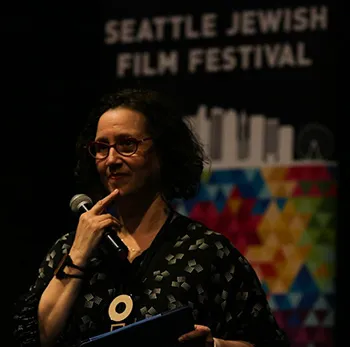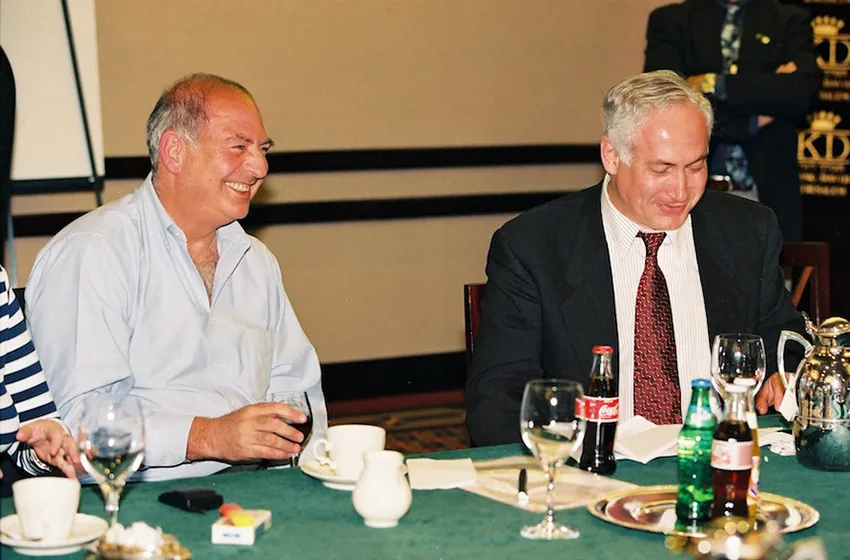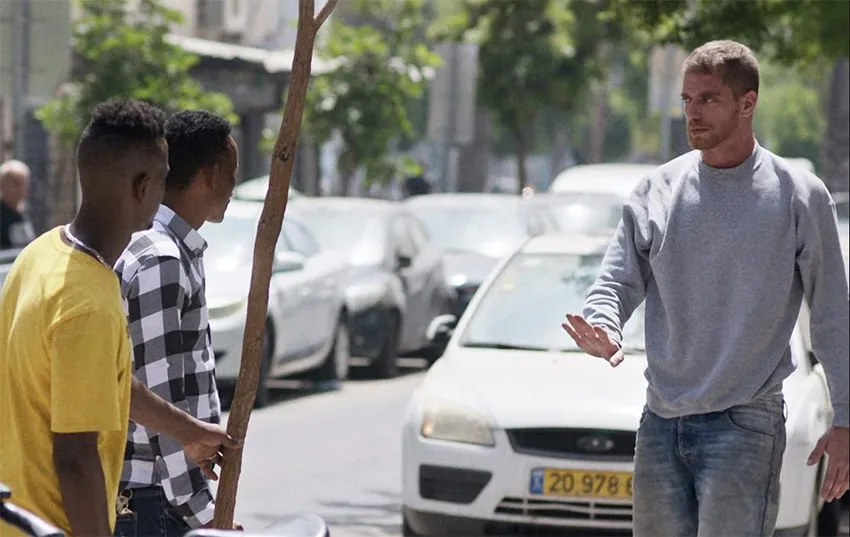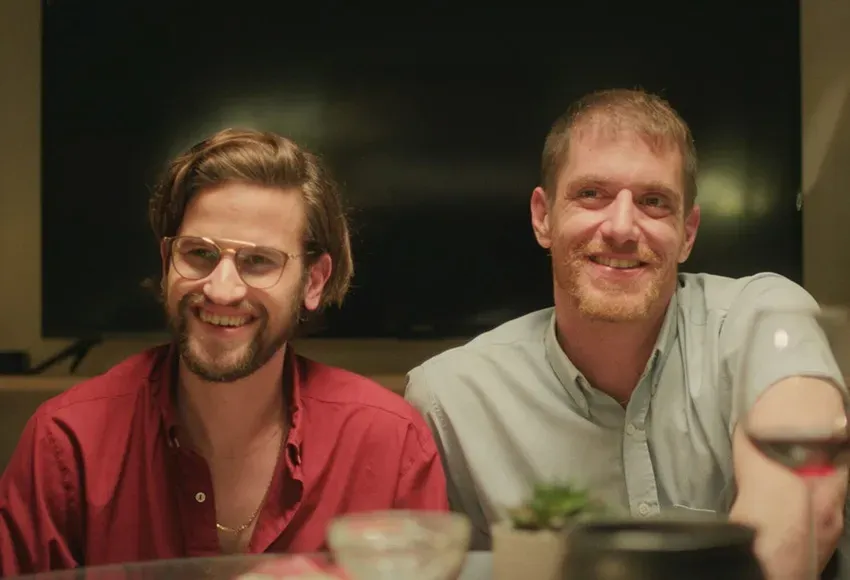Festival director Pamela Lavitt on Jewish film, Israel at 75, karaoke, and bringing audiences back inside the theater
The 28th annual Seattle Jewish Film Festival (SJFF) kicks off tomorrow night at 7:30 p.m. at AMC Pacific Place 11 with a raucous screening of writer-director Moshe Rosenthal's effervescent comedic melodrama Karaoke, complete with pre-show truffle popcorn, mocktails, and an on-screen introduction from lead actor Sasson Gabay (The Band's Visit, Shtisel). Afterward, festivalgoers are urged to stick around for an in-theater karaoke after-party.
But that's only one of many festivities planned for this year's 16-day hybrid (in-person and virtual) event. Theatrical offerings will happen over each weekend of the festival (March 11–12 and March 17–19), while the majority of the virtual options have screening windows running through March 26. There will also be special guests, events, food showcases, and several additional surprises, all of it helping fuel 2023's theme of "Cinemanna," a cinematic feast for the eyes.
I sat down with Pamela Lavitt, the director of Arts + Ideas & Festivals for the Stroum Jewish Community Center (SJCC) and longtime SJFF programmer, to chat about this year's event. Following are the edited transcripts from our wide-ranging conversation:

Sara Michelle Fetters: We haven't even started diving deep into our conversation, and I can already tell that you're especially energized for this year's festival. I can hear the excitement in your voice. Why that is? What is it about this year's event that has you buzzing?
Pamela Lavitt: Good question. I think why I'm buzzing is that this is the first time in three years that the possibility of really getting people back into the theater seems realistic. This is a real watershed moment, I think, for all of us to invest in seeing films once again in person. Largely on weekends, yes, but by giving people a festival that is cinema for the soul, that is going to create conversations that we haven't been having, and that's exciting.
I think I'm also energized by artists and the way that they continue to produce incredible, independent international cinema that you are not going to find squeaking through on a streaming service.
We're also offering something to the community that they can't get, which is a nourishing, fulfilling experience of togetherness. Last year we didn't believe that that many [festivalgoers] would come back. I think we kind of held our breath by using smaller theaters. But we still delivered great programming, and even though the vast majority of people participated virtually, it was still a terrific event.
So we're hopeful that the energy that we've put into increasing the number of films from 19 to 28 this year and increasing the opportunities to come into the theater will surpass the comforts of home and help fuel the desire that we have to reconnect with our fellow humans around incredible storytelling and meaningful conversations that you can't get anywhere else.
SMF: I am impressed by the balance that you are able to achieve between your in-theater options and your virtual selections.
PL: We are privileging in-person [screenings]. We're giving the full weight of our energy, our guest artists, our food, our razzmatazz... to getting people back into the theater. It's amazing to be together and eat a little popcorn and have a little bit of food and listen to music and converse afterwards and meet artists.
But we also know that some other conversations would need to be had virtually. We're releasing only a small subset of films this year that are virtual only, about eight or nine. This was, this is, important.
But the festival starts on March 11 and to get on board, we'd really love it for everyone to come down to the theater, otherwise you won't be able to see our opening night film, Karaoke, until March 20. That's a good 10 days later.
SMF: What was the thought process behind having all of the in-person screenings on the weekend?
PL: We can all study metrics and data and purchase histories and all of that, but the fact is, Jewish film festivals do tend to skew a little bit older. We also think that Saturdays and Sundays are just the best cinematic movie days.
We used to always move to a smaller theater midweek. We were at SIFF Cinema Uptown for many years, and I think those screenings may come back next year. Those nights were reserved for deeper dives into documentary films. We've kind of put that more in that virtual space for the time being.
We do hope that by next year everyone will say, I want to come back after work at 6:30 p.m. and go to the cinema on a Monday night. But right now, the feedback from the community was to prioritize the weekends. I know that there's been a retraction in a lot of festivals, so I think we're just putting our eggs into one basket [that] people will come back to the theater on a Saturday or a Sunday (or both).
If that's the case, maybe next year you're going to come back on a Wednesday or a Thursday, right? Let's see what works and what audiences are ready for.
SMF: You've really put an emphasis on celebrating "Israel at 75" for this year's festival. Could you tell me more about that?
PL: I don't want to be naive about planning an Israel milestone at a time when there's tremendous and important conflicting conversations that we need to have about Israel. I would say that the SJCC movement in general celebrates Israel for its culture, its food, etc., all in a nonideological way, but it's hard to avoid those conversations. Israel is a complex place that has an ever-changing government, and we can really debate what's happening and what we may be troubled by.
I would say that the "Israel at 75" started a year ago, when we knew [the anniversary] was coming up. But the films that we've selected are thorns and moles – there's some difficult stuff. This is not an easy version of celebrating Israel. I don't think we've shied away from anything.
For example, there's Savoy, a film about a woman, both Arabic-speaking and Hebrew-speaking, who was able to negotiate with her terrorist captors but was later vilified. Her journey was a difficult one.

And The Consultant: there is a lot of debate around this film – and there should be. It's a story about someone who [was] a political consultant and pollster for some of the more heinous political people in recent history. Yet [he was] leading a double life, and the minute that Massachusetts allowed for gay marriage, [he was] suddenly married and raising two children. It's a film about how those contradictions live within a person.
I feel like we're putting Israel at 75 under this type lens, one of celebration but also of analysis. Let's turn the spotlight on something that we need to discuss. I think in some American Jewish communities, there can be a somewhat naive version of celebrating Israel. I think that Jewish film festivals must look at the warts and the thorns. We need to start those conversations around immigration, queer communities, poor communities, and other issues that challenge Israel as opposed to just simply throwing a party.
SMF: I love that you bring up The Consultant... Maybe I'm just weird, I don't know, but I really do think that's going to make a perfect double feature with your "Gay Gezunt" (LGBT+ spotlight) film Concerned Citizen, even though they are completely different from a subject matter perspective.

PL: Absolutely. I think it was really interesting that Concerned Citizen in many ways is totally in the penumbra and this embrace of being a Queer film, but it's also a film about gentrification and the pushing of boundaries. Yet it's so inspiring and uplifting.
But it is an interesting combo. I would say, in general, we've shied away from films like The Consultant in the past because maybe they portray images of something that is very politically sort of sensitive right now, in this case the return of Netanyahu into the government of Israel. But I'm proud that we have two Queer films that will leave audiences wanting to have tough conversations. I like that we're showing varying sides of different coins about Israel.
SMF: And you also remember that as part of those discussions and as a facet of coming together like this, it's sometimes good to just sit down and sing together. I love that your opening night film is Karaoke, and then after Karaoke, you're having a karaoke party. In the theater. That's great.
PL: It's crazy, right? AMC said that they'd never done it before – they've had opera, they've had the Met, they've done all kinds of stuff, but they've never had karaoke on the big screen. I think they're missing out. We can't exactly be Rockbox, but how could I not try to make something like this happen? We just hope that it gets pulled off and, if people come and they sign up and they sing some karaoke for an hour, maybe we'll all head to Rockbox or someplace on Capitol Hill afterward? That's the goal.
SMF: On a more serious note, at the SJCC, how have things been going for you? These past few years, what's that been like for you as a programmer and an event planner?
PL: Thank you for asking that. The reality as a programmer is that we're sort of at this strange inflection point of not really knowing what to do next. Do people want to go back to large global music shows? We're still kind of baby-stepping.
For example, family programming has become huge need. We had 1,200 people show up in one day for three sold-out concerts. 1,200 people! We could barely get sometimes 50–100 people into a really high-level keynote with a sought-after author.
It's so hard to predict what will engage audiences and what will not. We're still on our heels, figuring out what do people want semi-post-pandemic. This is one reason why our author series this year is called "Chew on This," because it involves both chewing on food but also chewing on ideas.
We do want to take any opportunity to create meaning in our lives through conversation. Those conversations need to happen in person, if possible, and not necessarily on Zoom. People don't want to show up for Zoom cooking classes. [laughs]
I would say that we're incredibly, incredibly thankful for some of the relief funding that came our way from King County 4Culture, the Washington Festivals and Events Commission, and other community organizations. While we definitely had to scale back some, we're starting to ramp up again on our staffing, and that's exciting. But we had to scale back both our programming and our staffing for quite some time, and yet we still delivered with events for the whole community.
We've never stopped wanting to impact people's abilities to enter into conversations around building bridges in regards to Jewish and Israeli life in our community. We're still experimenting. We're excited to try new things. There are successes and there is some failure, and I think that's the way it should be.
Creating meaning that moves people in their souls seems more important than 400 butts in a movie theater seat anymore. If a hundred people show up and they've had an incredible experience, and they come back multiple times or buy a pass to the festival? That's the best feeling.
SMF: This brings me back to my first question. Listening to you, as difficult as these years have been, with all of us having to change how we live our lives, it's almost as if these hardships have reignited your passion for what you do.
PL: I appreciate that. These are the questions that you have to face: Do you go back to what you knew? Do you learn from the journey? How do you reassess, reevaluate, shift? There are some things that are amazing and continue to be successful. But I do think there is a "throw out the baby with the bathwater" thing that has happened through the pandemic.
It's all just mostly a matter of time, resources, staffing, and energy at this point. But it feels like there's a boundless opportunity to reinvent and create new experiences for people. I think that the experiential model seems to be what people are really looking for.
We are in the film, in some ways, the film of our own lives.
Cinema has always been a great place to bring people together, to get them into understanding more about Jewish life, Jewish identity, or even themselves. It's a great place to take a journey with your friends and partners, because it's fun.
But I'm in for the year-round commitment. I'm not just the film festival. I think that an arts programmer strives to deliver experiences. What do I deliver, and what does it tell me about what people want next? I'm in a listening campaign right now, and I think the SJCC is as well. We're trying a lot of different things to see what our community wants. That's exciting and energizing. The curation and the connections and the collaborations and the partnerships are always what get me going.
SMF: To close that thread, for everyone here in the Pacific Northwest, what do you hope they take away from this year's festival? What do you want them to be thinking about, whether they see one film or twenty?
PL: I think that we are in the business of community building in an authentic way. I think what I want people to take away is that we are the most open and welcoming international film festival, that happens to also be Jewish. My goal is to continue to make sure that we celebrate international independent cinema that really represents the best of what's out there in the world.
I want audiences to walk away thinking. I hope they learn something, deep down inside where it counts. But most of all I want them to enjoy themselves. When the lights go down, I want them to light up inside.
The Seattle Jewish Film Festival runs March 11–26, in person and virtually. A list of films and special events, plus ticketing and pass information, is available at https://sjcc.org/programs/arts-ideas/seattle-jewish-film-festival/.


